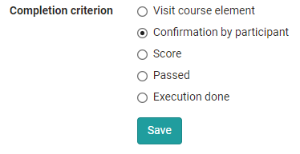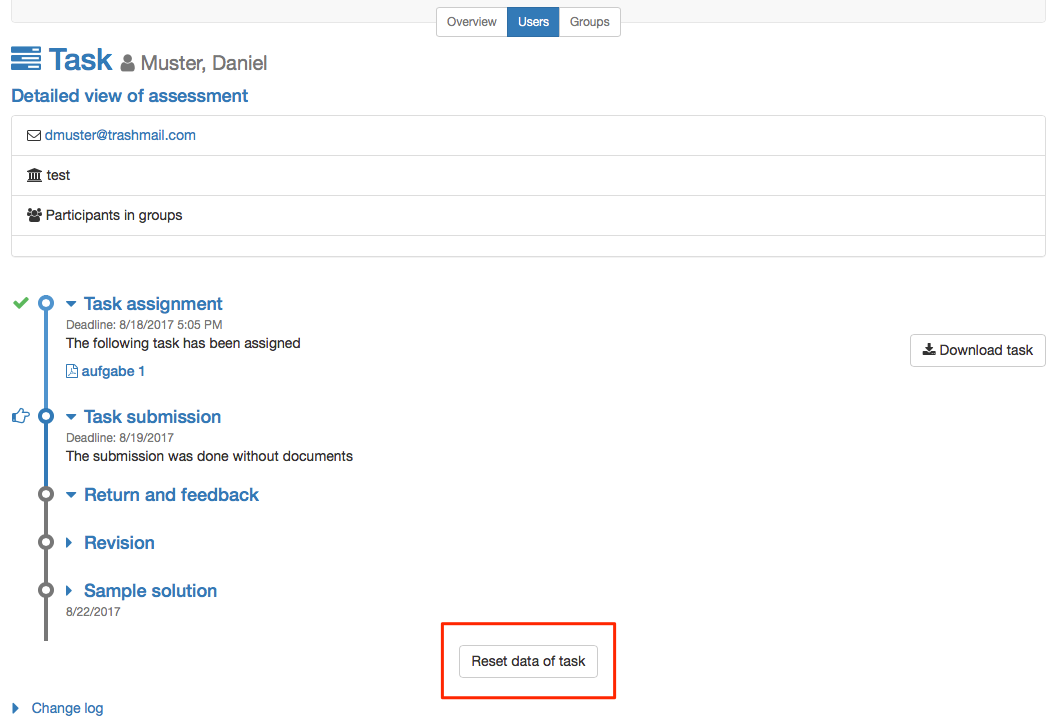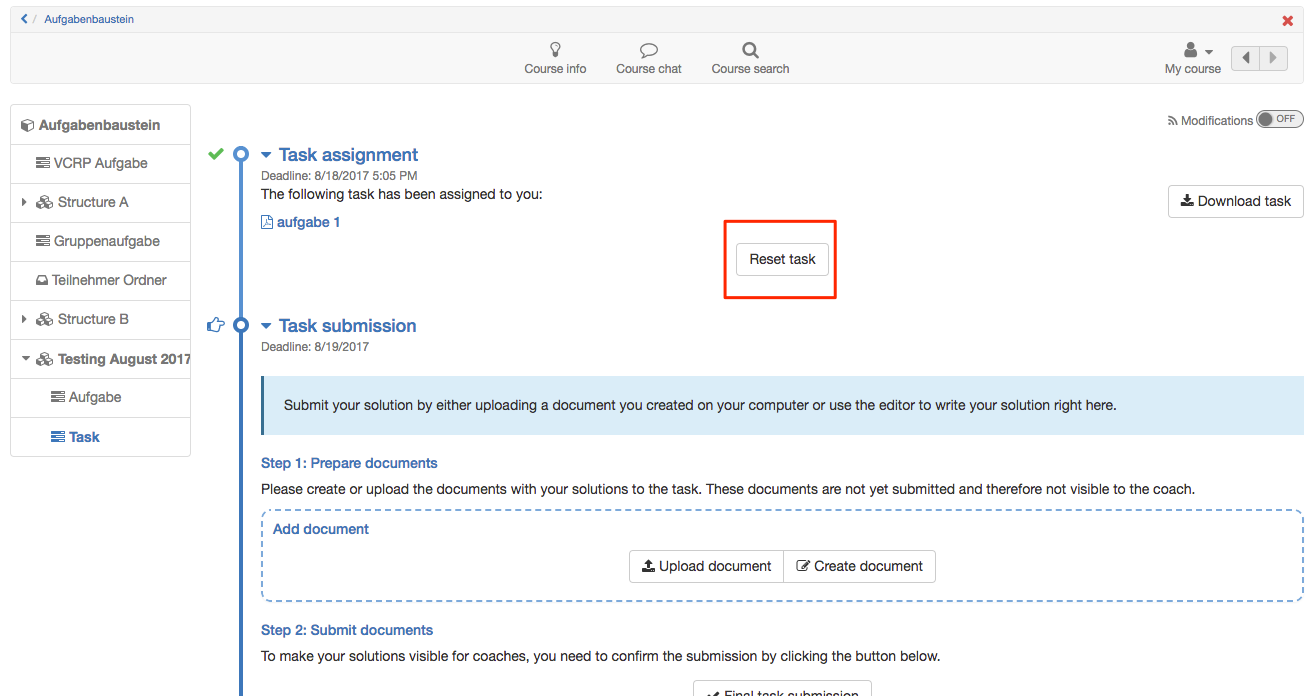Tab: Learning path
Here you define whether the execution of the task is obligatory or voluntary. Obligatory tasks are taken into account in the progress display, voluntary ones are not. Furthermore, you can define a time period in which the task can be processed. Outside this period, the task will be displayed in the left navigation, but it will not be accessible.
The Learning Path tab also defines which criterion must be met for the task to be considered "completed". The following options are available:
Visit course element: User has clicked on the course element.
Confirmation by participant: User hat auf die "Lesebestätigung" geklickt
Score: The user has achieved at least the specified score while completing the task.
Passed: The user has fulfilled the "passed" requirements configured in the " Grading" tab or the task has been manually set to passed by the coach.
Execution done: All steps of the task flow were run through.
Traditional courses do not have the "Learning Path" tab and instead have the "Visibility" and "Access" tabs, including expert mode.
Tab: Workflow
This is the central tab for configuring the course element Task. Here you can define which individual elements of the task are required in general. Should a concrete task be stored in the course element or will the user find the task somewhere else? Should the user hand in a document? Should there be feedback from the teacher? Should the user be able to revise a submission if necessary? Should a sample solution be provided? Should a score or passing be possible?
Simply activate the points you need and configure the relevant tabs in the next step.
The assignment, submission and sample solution steps can be configured with a deadline, with the assignment and submission open until that specific date, whereas the sample solution won't be available before the respective date. Starting from the date entered, the sample solution can be provided for all participants or only those who have worked on the task.
Instead of using a fixed calendar date, relative dates are available too, resulting in deadlines dependent on participant activities, such as a first course launch. All defined dates can be adapted individually, e.g. if a participant needs more time according to special circumstances. This is possible for all workflow steps. If the submission deadline is extended, the task will be opened again automatically.
Further relative date options are the course starting date (only available with a configured execution period), enrolment respectively booking date or the date of the task assignment.
In the group task, you additionally define in the "Task type" section for which groups or learning areas the task module is accessible.
If sample solutions are activated, you can also define here whether supervisors are allowed to add and edit documents.
Changing the workflow later will influence all individual participants and groups even if they already have started the assignment.
Changing the workflow, for example deleting the assignment step, will delete the corresponding elements from the workflow for all members or groups. Information about the chosen task will not be visible anymore. If you reactivate the element of the workflow the information will be accessable again.
However, if you add the assignment step later and a member or group is already further into the task, then they don't have to choose an assignment anymore.
Tab: Assignment
You either upload directly create your task files in the tab "Assignment."
More files than one for a single task can be provided by uploading all required files in .zip file format. If a task is created with the internal OpenOlat editor, multiple files such as images or PDF files can be provided by first uploading them in the WYSIWYG editor and then linking them in the corresponding html page. Such a task will then be downloaded in .zip file format as well. If the HTML editor is used, the stored title is automatically used as the file name. However, this can be changed at any time.
In the section "Type of assignment" you determine whether a course participant is offered all available tasks for selection or whether a task is automatically assigned to him/her by random selection.
Please note: If multiple files are stored in the Task tab, they will be considered as multiple different tasks. It is not a task with several complementary files.
In the field "Message for user" you can provide general information for all course participants regarding your tasks.
If additional document editors are activated in the administration, additional file formats can also be created. For example, if Only Office is used, Word, Excel or PowerPoint files can also be created. The same applies to the creation of other (feedback) files.
In the setting manual choice, if a course participant choses by incident a wrong or not-wanted assignment, it can be reset in the assessment tool by the course owner.
The assignment is not reset automatically. The participant gets the opportunity to undo all pervious steps.
In group tasks only one task can be chosen by the group. As soon as one member picks a task, this choice counts for all group members.
Tab: Submission
Determine how participants are allowed to hand in documents and how many in the segment "Submission configuration". Submitting with the embedded text editor allows the creation of HTML documents directly in the course element. If only the option "Submit files created with external editor" is enabled, course participants will have to have their documents ready for upload in an established file format. Enter a number in the field "Max. number of documents" in order to restrict the number of documents uploaded.
In the "Submission confirmation" segment you will find the standard phrase to confirm that course participants have submitted their solutions successfully. This text can be adapted if necessary. The option "Send text additionally as e-mail" means that your text will be sent by e-mail as well. In group tasks all members get an e-mail confirmation.
Tab: Return and feedback
Here you can define the minimum and maximum number of return documents.
Tab: Assessment
Here you define how each course participant shall be assessed. By default a tutor can assess tasks by means of "Passed/failed." If you prefer to allocate points instead or in addition just modify your configuration by indicating a minimum and maximum score or by replacing "Passed/failed" automatically with a passing score. Optionally you can provide space for individual comments regarding each course participant. In addition you can provide further information in the fields "Notice for all users" and "Notice for tutors," e.g. some general comment on how to assess course participants.
Tab: Sample Solution
In order to provide all course participants with a sample solution regarding your tasks just either upload appropriate documents or directly create them via the embedded text editor. The sample solution is visible after the coach accepted solution documents for submission.
If you wish to provide assistance in solving the task, you can add additional documents to the task by packing all documents and upload as .zip file in the assignment tab.
Tab: HighScore
If the assignment of scores has also been activated for the task, the Highscore tab can also be configured in more detail. You can specify the start date and define which elements are displayed and whether the display should be anonymous.




